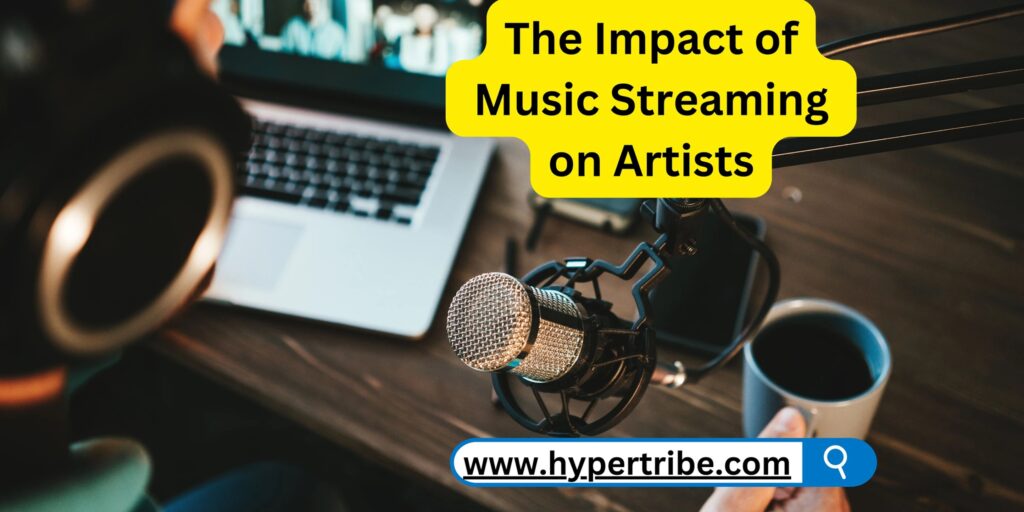The Evolution of Music Streaming
From CDs to Digital Downloads
Recall the times when having a large CD collection would have been a badge of pride. The change from hard-copy CDs to digital downloads signaled a major turning point in our musical consumption. Changes in consumer behavior and technology breakthroughs propelled this metamorphosis.
Early in the new millennium, digital downloads’ quick pleasure and ease started to eclipse the conventional CD format. Just a few clicks would let listeners access their preferred tunes from home without going. This change improved the portability and accessibility of music as well as being practical. Thanks to MP3 players and cellphones, you may have a pocketbook full of tunes.
Music consumption was profoundly affected. Digital downloads let listeners easily create their collections and find fresh musicians. This was the start of a more flexible and customized musical experience.
The Rise of Streaming Platforms
Another revolution was in development as digital downloads became accepted: music streaming. Our consumption of music has been transformed by streaming companies such as Spotify, Apple Music, and Tidal. Users now have access to large catalogs of music for a monthly membership fee rather than buying single songs or albums.
The music business has been substantially changed by this shift from owning to streaming songs. It has democratized music, therefore enabling musicians to reach listeners all across the world. Furthermore, streaming services have brought fresh income sources for record companies and musicians.
Streaming has also affected our approach to finding music. The music listening experience now consists mostly of curated playlists, tailored recommendations, and algorithm-driven suggestions. Thanks to this change, music is more varied and easily available than years ago.
The Impact of Music Streaming on Artists

For audiences, streaming has helped; for artists, it has presented possibilities as well as problems. One may argue that streaming services have enabled independent musicians to reach listeners free from the support of big record companies. Conversely, compared to conventional record sales, the income from streaming is usually somewhat little.
Artists must nowadays fit this new terrain. The success of their music depends on streaming statistics, which also guide their tour schedule. Furthermore, vital instruments for developing and involving fan networks are social media and digital marketing.
Notwithstanding the difficulties, streaming sites have created fresh creative and cooperative opportunities. Artists may play many genres, put more songs out there, and interact personally with their listeners.
Innovative Business Models in the Music Industry
Crowdfunding and Fan Sponsorship
For financing music productions, crowdfunding and fan sponsorship have grown to be reasonable substitutes. Artists may raise money straight from their supporters on sites like Patreon and Kickstarter. Among the benefits this approach provides are creative flexibility and a larger audience reach.
Throughout the creative process, artists may interact with their fans providing updates, behind-the-scenes materials, and special prizes. For supporters, this direct involvement builds loyalty and community.
Good crowdsourcing projects need very meticulous marketing and preparation. Artists have to provide interesting proposals, establish reasonable financing targets, and keep their word to their sponsors. Done properly, crowdsourcing may provide fans with useful comments and financial help.
Blockchain Technology and Smart Contracts
Blockchain technology may transform the music business. It provides fair remuneration, safe ownership monitoring, and peer-to-peer, middle-free transactions. By automating license and royalty payments, smart contracts help to guarantee artists get fair and open compensation.
Including blockchain technology in the music business can provide difficulties, however. The technology is still in its early years, hence broad acceptance will depend on industry-wide collaboration. Still, blockchain has the potential to solve long-standing problems about artist pay and copyright management.
Data-driven Decision Making in Music
In the music industry, data-driven decision-making has become an essential tool for artists, record labels, and streaming platforms. By analyzing vast amounts of data, industry professionals can gain valuable insights into listener preferences, trends, and market demands. Tools such as advanced analytics software and machine learning algorithms enable them to make informed decisions about marketing strategies, content creation, and artist development.
One of the key benefits of data-driven decision-making is the ability to identify emerging trends and target specific audiences. By analyzing streaming data, record labels can identify which songs are gaining popularity and tailor their promotional efforts accordingly. This allows them to allocate resources more effectively and increase the chances of success for their artists.
Additionally, data-driven decision-making can help artists understand their audience better and create music that resonates with them. By analyzing listener data, artists can gain insights into the demographics, preferences, and behaviors of their fans. This information can be used to inform songwriting, production choices, and even live performances.
Furthermore, data-driven decision-making can also help in optimizing revenue streams for artists and record labels. By analyzing data on streaming, sales, and licensing, industry professionals can identify the most profitable channels and make strategic decisions about distribution and monetization.
In conclusion, data-driven decision-making is a powerful tool that is revolutionizing the music industry. It enables industry professionals to make informed decisions, identify trends, understand audiences, and optimize revenue streams. By leveraging the power of data, the music industry can continue to innovate and thrive in the digital age.
The Role of Artificial Intelligence in Music Creation
AI-assisted Songwriting and Composition
AI may create creative compositions by examining musical data. This technology may help musicians explore uncharted musical ground and boost output. AI-generated music may be useful for inspiration and experimentation even if it is not designed to replace human creativity.

Music Recommendation Systems
A mainstay of music streaming services is now tailored playlists and suggestions. AI systems examine user information to propose music and performers that fit personal tastes. This improves user experience and lets listeners find fresh music.
AI-generated Music and Copyright Issues
Originality in AI-generated music begs serious copyright and ownership legal issues. The music business has to handle difficult legal questions as artificial intelligence develops to safeguard artists’ rights and provide just pay.
The Influence of Social Media on Music Promotion
Building a Fanbase through Social Media
Social media lets musicians interact with and create for their following. They may post behind-the-scenes material, communicate with supporters via comments and messages, and let their audience know about forthcoming events and new products.
Using social media for musical marketing calls for consistency and imagination. Artists have to keep current with business developments and modify their plans to properly reach their target market.
Influencer Marketing in the Music Industry
The music business has taken to influencer marketing. Working with well-known celebrities may let musicians produce real, interesting material and reach new markets. Influencer relationships help to increase involvement and support attempts at music promotion.
The Power of Viral Trends and Challenges
Social media viral trends and issues provide chances for music marketing. Content created by artists should be unforgettable and shareable with their target market. Following viral trends could help one become well-known and increase their fan base.
Conclusion
Driven by technology improvements and shifting customer behavior, the music business is always evolving. From the change from CDs to digital downloads, the emergence of streaming platforms, and the influence of artificial intelligence on music production, innovation keeps reshining the business.
These developments offer more access to various music and tailored experiences for those who like it. For musicians, they provide fresh chances for inspiration, teamwork, and audience interaction.
Looking to launch a music career? HyperTribe Ltd offers valuable insights and tips through our blog to help you navigate the music industry. From professional interviews to advice from our founder Kimmy Dickson, we cover everything you need to know to succeed in the music business. Join our membership to access exclusive resources and network with other industry professionals. Visit our website to learn more and start your journey to success in the music industry.



